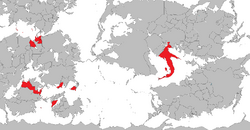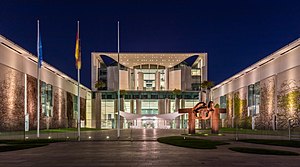Trans-Toyana Prosper Alliance
 | |
 TTPA Member States | |
| Nickname | TTPA |
|---|---|
| Formation | February 28, 2002 |
| Founder | Drambenburg |
| Founded at | Lerbin |
| Purpose | International military and economic alliance |
| Headquarters | Essen, Drambenburg |
Membership | 14 member states |
Official language | English |
Secretary General | Fahid Abdullah - Zalluabed |
Budget (2023) | Z$1.212 Trillion |
| Trans-Toyana Prosper Alliance Charter [Charter link] | |
The Trans-Toyana Prosper Alliance, abbreviated to TTPA is an international military and economic alliance which promotes intergovernmental cooperation and facilitates economic, political, security, military, educational, and sociocultural integration between its members and other countries. The TTPA was formed January 15th, 1966 between the UCSS and Drambenburg as the Grand Alliance. Throughout the Cold War, the main purpose of the Grand Alliance was to act as a mediation to the often tense political dynamics between capitalist and communist powers. Following the breakup of the UCSS in 1999, the Grand Alliance restructured at the Lerbin Conference, where a new charter was drafted in response to the Alabaster Treaty and the formation of the Western Euronia Defense Alliance. The TTPA's stated aim is to prevent overt foreign influence from superpowers and super-alliances such as WEDA, ACWAC, and PADC, and to offer alternative diplomatic paths to developing nations whose governments are seeking to avoid said influence.
The purpose and intentions of the TTPA, as well as its number of members, have changed throughout the years, and the organization is often criticized for many of its member states' human rights records and authoritarian governments. Several nations have left the TTPA after major geopolitical events or ideological divides within the organization. Examples include: the Tarijar Strait intervention, which led to Qolaysia's withdrawal; the Jinchon Sea crisis and expansion of ACWAC, which led to Barangadesh and Beleroskov's withdrawal; 2022 invasion and annexation of Blaoria by Drambenburg, which led to Haduastan's withdrawal; the creation of PADC, which led to Kossmil's withdrawal.
Overview
Constitution and Governance
The TTPA is led by the executive, the Secretary General, currently Fahid Abdullah of Zalluabed.
Further governance is provided by the Estates General, a deliberative assembly which consists of one member from each nation.
Goals
The primary goal of the TTPA is to grow international trade and bring prosperity to member nations through shared free trade, military agreements, cultural integration, and political ideology.
Charter
History
Background
Following the end of World War, in an effort to regain financial stability and military prowess, Drambenburg sought out an alliance with Beleroskov.
Founding
The TTPA was established on February 28th, 2002, in Lerbin.
Tarijar Strait Crisis
Hisrea War
The TTPA's first largescale combat military deployment was in Zalluabed in June of 2021 in response to an escalating rebellion by the HPLF in the province of Hisrea. Aside from casualties sustained by Zalluabedi forces, Buckingla suffered 129 killed and 939 wounded, Beleroskov suffered 9 killed and 78 wounded, Drambenburg suffered 4 killed and 14 wounded, and Kossmil suffered 18 killed and 22 wounded. The conflict ended with the partition of Hisrea in the Osea Accords.
Departure of Qoylasia, Haduastan, and Beleroskov
Due to President Nizaam bin Aayid's reforms and restructuring within Qolaysia, the government of Qoylasia formally withdrew membership in the TTPA on Sunday, April 24th, 2022. Geopolitical issues in Southern Adula pressed Qoylasia decision to become more individualized in terms of alliances.
On May 3rd, 2022 President Nikolai Ubotrov announced that Beleroskov was formally withdrawing membership in the TTPA because of disagreements with TTPA leadership and connections with WEDA. Instead, Beleroskov joined the Alliance of Central and West Ausianan Cooperation. Haduastan also left the organization, with Prime Minister Sartaj Bali desiring to take a more neutral path.
2022 Blaoria War
In September of 2022, war broke out in Blaoria between Blaorian troops under the command of Prime Minister Edelstein and Drambenburgian troops called into the country by runner-up Johannes Schnable. The resulting conflict split nations in the TTPA, with many condemning Drambenburg's actions, while other's joined Drambenburg's expiditionary force with the intent to "restore order" in Blaoria.
Membership
Full, voting member states of the TTPA are:
 Ascacia
Ascacia Behinia
Behinia Buckingla
Buckingla Drambenburg
Drambenburg Gladysynthia
Gladysynthia Jumbosa
Jumbosa Jyau
Jyau Nancaya
Nancaya Nebetia
Nebetia Oeslia
Oeslia Peoratia
PeoratiaRajihat
 Styrae
Styrae United Cavollon
United Cavollon Zalluabed
Zalluabed
TTPA Observers
A number of non-charter nations have sent delegates to TTPA summits. Others have permanent, non-voting delegates with the TTPA council.
